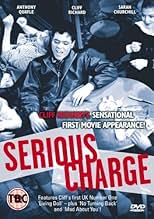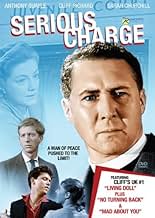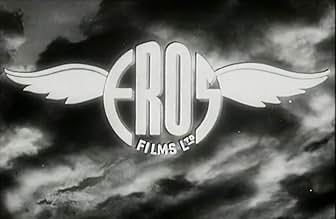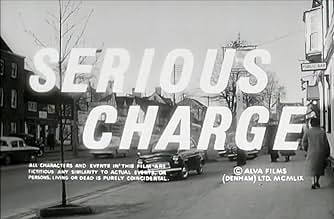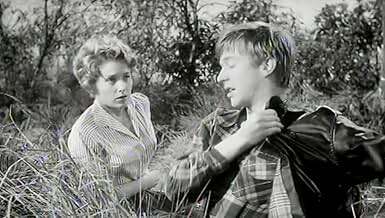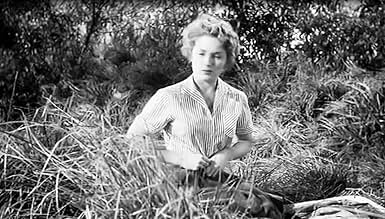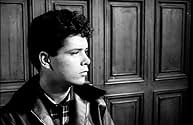A vicar falsely accused of assaulting a youth attempts to prove his innocence and save his reputation.A vicar falsely accused of assaulting a youth attempts to prove his innocence and save his reputation.A vicar falsely accused of assaulting a youth attempts to prove his innocence and save his reputation.
- Director
- Writers
- Stars
Jess Conrad
- Dancer
- (uncredited)
Marie Devereux
- Sexy Girl in Coffee Bar
- (uncredited)
Carol Dourof
- Dancer
- (uncredited)
- Director
- Writers
- All cast & crew
- Production, box office & more at IMDbPro
6.4300
1
2
3
4
5
6
7
8
9
10
Featured reviews
Surprisingly Frank
An unmarried vicar in a new parish (Quayle) accuses a local 19 year old of being partially responsible for the death of a teenage girl. In defiance, the young man claims the vicar molested him. Out of spite, his story is backed up by a local woman (Churchill) still furious that the vicar rejected her advances. Unfortunately for the vicar, the woman is a highly respected member of the community - her father is the previous clergyman.
Given that this film was released in 1959, its subject matter is pretty ground-breaking, especially for a British film. Yes, the depiction of disaffected youth hanging around coffee bars, breaking into swimming pools and grooving to Cliff Richard's Livin' Doll is a little clumsy (Richard is asked to do little in a secondary role other than sulk or croon), but in an era when folks weren't supposed to know about homosexuality (at least in the movies), this is quite a daring story, and occasionally quite subversive. We the audience are ever so slightly encouraged to wonder about Quayle's sexuality as he spurns the advances of a good churchy woman, seems oblivious to his sexy young French maid (!) and looks up to his strident mother (a wonderfully knowing performance by Irene Browne). Judith Furse's probation officer is also deliciously ambiguous...
So quite a grown up film then - a shame that these days it's probably only known for being Cliff's debut film.
Given that this film was released in 1959, its subject matter is pretty ground-breaking, especially for a British film. Yes, the depiction of disaffected youth hanging around coffee bars, breaking into swimming pools and grooving to Cliff Richard's Livin' Doll is a little clumsy (Richard is asked to do little in a secondary role other than sulk or croon), but in an era when folks weren't supposed to know about homosexuality (at least in the movies), this is quite a daring story, and occasionally quite subversive. We the audience are ever so slightly encouraged to wonder about Quayle's sexuality as he spurns the advances of a good churchy woman, seems oblivious to his sexy young French maid (!) and looks up to his strident mother (a wonderfully knowing performance by Irene Browne). Judith Furse's probation officer is also deliciously ambiguous...
So quite a grown up film then - a shame that these days it's probably only known for being Cliff's debut film.
Has anything really changed since 1959?
I have only just seen this film on an obscure satellite channel. Way ahead of its time. It would not be out of place if it were remade today (without the awful version of "Livin' Doll"!) Does anyone know who played the youths in the film (apart from Cliff Richard and Andrew Ray) One looked like Nanette Newman and another like Bryan Forbes but they are not mentioned on this site. If it is them perhaps this film is where they met and fell in love.
One thing that struck me as I watched the film is that 46 years on nothing has changed, at least not for the better. A sad indictment on our society.
One thing that struck me as I watched the film is that 46 years on nothing has changed, at least not for the better. A sad indictment on our society.
Absurd fun if you are in the mood
This was the first film to deal with homosexuality in British cinema, and it is absurd as there is not one homosexual character in it. I say this, and without spoilers, that the Vicar might be, well, repressed but it is all such a muddle I ended up not caring. But disregarding this the acting is not bad and Anthony Quayle, Sarah Churchill and especially Irene Browne are excellent. Irene Browne, the Vicar's mother has the best lines in the film, and her voice alone commands attention. I will just say that the vicar falls into troubled waters and there is an attempt at showing homophobia and the human havoc it can cause. Andrew Ray attempts being convincing as a juvenile delinquent ( very attractive to 1950's audiences ) but of course to be disapproved of. Cliff Richard improbably plays another delinquent and ridiculously stops the film by singing ' Living Doll ' which was a hit at the time. All this sounds as if I do not like watching it, and that is not true. When I feel low I watch it just for the acting, and its enjoyable absurdity. And even Sarah Churchill transforms herself from being prudish, sexually repressed and drab into one of the best ( elegant ) seducers on film. I like watching her in anything. See it and smile and remember that this really is an imitation of life. I give it just 5 because the actors save the film from poor direction and an awful musical soundtrack.
Charge Of The Right Brigade
For about the first hour this low-budget movie had definite aspirations of being added to the pantheon of significant films of the British New Wave, otherwise known as "kitchen-sink" dramas. Unfortunately it tails off tamely in the final half-hour as it retreats from the boldness of its narrative as just desserts are meted out and worse, love looks like it might conquer all.
Notable for being an early outing for later Bond director Terence Young as well as the feature debut for veteran British pop star, Cliff Richard, its plot is heavily derived from Arthur Miller's "The Crucible" as a respectable pillar of a small town community is accused of a scandalising, career-threatening crime by a grudge-bearing teenager, indeed, it's no surprise to learn that the film is itself an adaptation of a recent play. While there's no sub-text here of the Hollywood witch-hunt, the film does at least commendably approach the taboo subjects of pre-marital sex and homosexuality, remembering in particular that there was no Pill and that the latter was still a criminal offence in the U. K. until 1967.
The venerable Anthony Quayle plays a venerable parish priest looking in particular to have some positive interaction with the local youths. Of course being the 50's, some of these include the English version of the world phenomenon of teenage delinquency, who openly rebel against their elders, usually carrying concealed weapons like knuckle-dusters and chains and with a penchant for rock and roll music. Leader of this particular band is the tearaway Larry Thompson, played by Andrew Ray, who in addition to the above, has also abandoned a young girl he's got pregnant. He has a kid brother halfway to following him into minor crime, played by the debuting Cliff, who Quayle tries to rescue and a violent, brutish father who you wouldn't want turning up at your door with a grievance late at night. Lucky then that Quayle also trains the kids at boxing.
At the vicarage, passions are overheating, firstly in the form of the vicar's new, pretty young French maid who gets herself involved with Larry but secondly and more significantly with Sarah Churchill's man-hunting Hester, another vicar's respectable daughter, who makes a bee-line for Quayle. Hell hath no fury as we all know and when she's spurned by Quayle, she finds a way to revenge herself on him by supporting a false claim of molestation brought against the vicar by Larry, this after the poor pregnant girl has been accidentally knocked down and killed after she sees him making out with the maid in a bus-shelter and Quayle has summoned Larry to the vicarage to confront him about his treatment of the dead girl.
So far so good as the film confronts its contentious subject of alleged homosexuality with refreshing candour as the town turns against the heretofore admired vicar who now faces the ruination of his career. Unfortunately just as events edge towards a dramatic peak, the film draws back with a Damascene conversion, a ludicrously staged exposé scene and even worse, a final reconciliation with a romantic undertone which undoes much of the realism which has gone before.
Never mind, possibly the narrative was necessarily bowing to the censorship laws of the time, it's just a pity that having put its head above the parapet towards modernity, it felt it had to withdraw it again for a diluted happy ending.
Quayle is very good as the conscientious preacher, likewise Ray and Churchill in slightly more cliched roles. Cliff doesn't get to do much other than look pretty and sing a rocking version of his hit ballad "Living Doll". There's strong support from recognisably stalwart British character actors, the best of whom I thought was Irene Browne as Quayle's supportive and perceptive mother.
While the film is a little dated by its treatment of its hep-catting rock and roll juveniles, and ultimately cops out from fully confronting societal attitudes of the time, it at least openly raises the subjects of teenage pregnancy and homosexual behaviour and still feels like a further step along the road to challenging the norms of the day and is to be commended for that.
Notable for being an early outing for later Bond director Terence Young as well as the feature debut for veteran British pop star, Cliff Richard, its plot is heavily derived from Arthur Miller's "The Crucible" as a respectable pillar of a small town community is accused of a scandalising, career-threatening crime by a grudge-bearing teenager, indeed, it's no surprise to learn that the film is itself an adaptation of a recent play. While there's no sub-text here of the Hollywood witch-hunt, the film does at least commendably approach the taboo subjects of pre-marital sex and homosexuality, remembering in particular that there was no Pill and that the latter was still a criminal offence in the U. K. until 1967.
The venerable Anthony Quayle plays a venerable parish priest looking in particular to have some positive interaction with the local youths. Of course being the 50's, some of these include the English version of the world phenomenon of teenage delinquency, who openly rebel against their elders, usually carrying concealed weapons like knuckle-dusters and chains and with a penchant for rock and roll music. Leader of this particular band is the tearaway Larry Thompson, played by Andrew Ray, who in addition to the above, has also abandoned a young girl he's got pregnant. He has a kid brother halfway to following him into minor crime, played by the debuting Cliff, who Quayle tries to rescue and a violent, brutish father who you wouldn't want turning up at your door with a grievance late at night. Lucky then that Quayle also trains the kids at boxing.
At the vicarage, passions are overheating, firstly in the form of the vicar's new, pretty young French maid who gets herself involved with Larry but secondly and more significantly with Sarah Churchill's man-hunting Hester, another vicar's respectable daughter, who makes a bee-line for Quayle. Hell hath no fury as we all know and when she's spurned by Quayle, she finds a way to revenge herself on him by supporting a false claim of molestation brought against the vicar by Larry, this after the poor pregnant girl has been accidentally knocked down and killed after she sees him making out with the maid in a bus-shelter and Quayle has summoned Larry to the vicarage to confront him about his treatment of the dead girl.
So far so good as the film confronts its contentious subject of alleged homosexuality with refreshing candour as the town turns against the heretofore admired vicar who now faces the ruination of his career. Unfortunately just as events edge towards a dramatic peak, the film draws back with a Damascene conversion, a ludicrously staged exposé scene and even worse, a final reconciliation with a romantic undertone which undoes much of the realism which has gone before.
Never mind, possibly the narrative was necessarily bowing to the censorship laws of the time, it's just a pity that having put its head above the parapet towards modernity, it felt it had to withdraw it again for a diluted happy ending.
Quayle is very good as the conscientious preacher, likewise Ray and Churchill in slightly more cliched roles. Cliff doesn't get to do much other than look pretty and sing a rocking version of his hit ballad "Living Doll". There's strong support from recognisably stalwart British character actors, the best of whom I thought was Irene Browne as Quayle's supportive and perceptive mother.
While the film is a little dated by its treatment of its hep-catting rock and roll juveniles, and ultimately cops out from fully confronting societal attitudes of the time, it at least openly raises the subjects of teenage pregnancy and homosexual behaviour and still feels like a further step along the road to challenging the norms of the day and is to be commended for that.
A serious and intelligence picture
Very daring for its day (1959) "Serious Charge" may now look very much like a period piece yet this British movie about a vicar falsely accused of molesting a teenage boy still packs a punch thanks in large part to a fine script by Guy Elmes and Mickey Delamar and good performances from Anthony Quayle as the vicar, Andrew Ray as the boy who makes the allegation, Sarah Churchill as the woman who has the hots for Quayle and, perhaps best of all, Irene Browne as Quayle's no-nonsense mother. It was also the film that introduced a young Cliff Richard to the big screen as Ray's younger brother, (he sings "Livin' Doll"). Now Cliff and the teenage teraways are the films weakest links which in all other respects treats its subject seriously and with a surprising degree of intelligence. It's almost unimaginable that a similar film would have been made in America at this time.
Did you know
- TriviaThe song, "Living Doll" by Cliff Richard and The Shadows (as The Drifters) was released as a single (in a different arrangement) as a spin off from this film. It was a British #1, and was the top-selling song of 1959.
- Quotes
Mrs. Phillips: Now, do let's sit down, Hester. You're taking to another woman, not one of those helpless males who can't discuss anything important or private without staring out of a window or looking confused.
Hester Peters: I don't wish to be rude...
Mrs. Phillips: You can, my dear, because I'm going to be extremely rude to you.
- ConnectionsFeatured in A Bit of Scarlet (1997)
- SoundtracksLiving Doll
by Lionel Bart
Cliff Richard song
Accompanied by The Shadows (as The Drifters) (uncredited)
Details
- Runtime
- 1h 39m(99 min)
- Color
- Aspect ratio
- 1.37 : 1
Contribute to this page
Suggest an edit or add missing content

